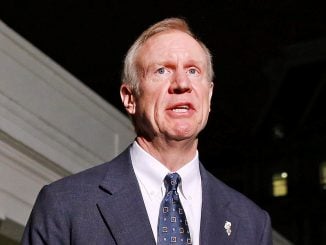
WASHINGTON – The U.S. Senate narrowly approved a tax overhaul on Saturday, moving Republicans and President Donald Trump a big step closer to their goal of slashing taxes for businesses and the rich while offering everyday Americans a mixed bag of changes.
In what would be the largest change to U.S. tax laws since the 1980s, Republicans want to add $1.4 trillion over 10 years to the $20 trillion national debt to finance changes that they say would further boost an already growing economy.
Trump, speaking to reporters as he left the White House for New York hours after the pre-dawn vote, praised the Senate for passing “tremendous tax reform” and said “people are going to be very, very happy.”
Once the Senate and House of Representatives reconcile their respective versions of the legislation, he said, the resulting bill could cut the corporate tax rate from 35 percent “to 20 (percent). It could be 22 (percent) when it comes out. It could also be 20 (percent).” U.S. stock markets have rallied for months on hopes that Washington would provide significant tax cuts for corporations.
Celebrating their Senate victory, Republican leaders predicted the tax cuts would encourage U.S. companies to invest more and boost economic growth.
Following Saturday’s vote, Senator Richard Burr (R-NC) said, “I’m incredibly pleased to see the Senate’s passage of the Tax Cuts and Jobs Act this morning. This bill is an historic opportunity to reform a broken tax code that hasn’t worked for the people of this country in years. We have a responsibility to get our economy moving and put more money back in the pockets of the hard-working Americans who earned it in the first place.”
Senator Thom Tillis (R-NC) echoed Burr’s support for the bill. “Today, the Senate voted to take us one step closer to historic tax reform that will lead to bigger paychecks for hardworking Americans, and will make our nation more competitive at the global level. In the coming days, differences between the House and Senate versions of the Tax Cuts and Jobs Act will be resolved and improvements will be made, and I’m confident the end result will deliver on our promise to provide much-needed tax relief for the American people.”
The votes for each of the House and Senate versions of the tax bill came along party lines for North Carolina’s congressional delegation, with the exception of Rep. Walter Jones, a Farmville Republican. After the House vote on November 16, Jones released a statement addressing his opposition to the bill. “I’m all for tax reform, but it must grow the economy, not the debt,” by borrowing from “potential foreign adversaries like China, and then put on the backs of American taxpayers,” Jones said.
Advocates of the proposed reforms point to the smaller-scale effects on families, job seekers and small businesses that they say will boost the national economy by simplifying the tax code, lowering rates and creating jobs.
The Tax Foundation, an independent tax policy research organization in Washington, D.C., conducted a state-by-state analysis of the Senate’s bill which highlights potential employment and income numbers that could change if enacted. In North Carolina, the Foundation estimates the creation of nearly 28,000 jobs and an average after-tax income increase of $2,366 per middle income family.
The analysis also detailed the Senate’s proposed elimination of state and local tax deductions. While this would affect the 29 percent of North Carolina residents who itemize these deductions, it will be a larger burden for residents of higher tax states like New York and New Jersey.
The House and Senate versions of the tax bill will now be debated in a conference committee behind closed doors. Each chamber is expected to set conferees by the end of this week.
Reuters contributed to this report



